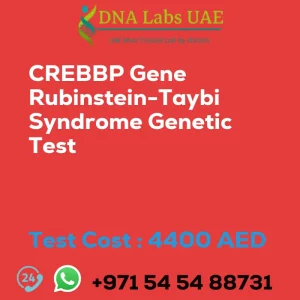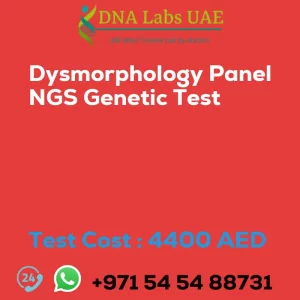TUBB2B Gene Polymicrogyria Asymmetric Genetic Test
Are you concerned about polymicrogyria and its genetic causes? DNA Labs UAE offers the TUBB2B Gene Polymicrogyria Asymmetric Genetic Test to help diagnose and understand this condition. Read on to learn more about the test details, cost, symptoms, diagnosis, and more.
Test Name: TUBB2B Gene Polymicrogyria Asymmetric Genetic Test
Components:
- Price: 4400.0 AED
- Sample Condition: Blood or Extracted DNA or One drop Blood on FTA Card
- Report Delivery: 3 to 4 Weeks
- Method: NGS Technology
- Test Type: Dysmorphology
- Doctor: Pediatrics
- Test Department: Genetics
Pre Test Information:
Before undergoing the TUBB2B Gene Polymicrogyria Asymmetric NGS Genetic DNA Test, it is important to provide the clinical history of the patient. Additionally, a genetic counseling session will be conducted to draw a pedigree chart of family members affected by the TUBB2B Gene Polymicrogyria Asymmetric NGS Genetic DNA Test gene (TUBB2B).
Test Details:
The TUBB2B gene is associated with polymicrogyria, a brain malformation characterized by an excessive number of small, irregularly formed brain folds. This condition can result in various neurological symptoms, including developmental delays, intellectual disability, seizures, and motor impairments. The NGS genetic test, also known as Next-Generation Sequencing, is a high-throughput DNA sequencing technology that allows for the analysis of multiple genes simultaneously.
In the context of polymicrogyria, the NGS genetic test helps identify mutations or variations in the TUBB2B gene that may contribute to the condition. The term “asymmetric” in this context indicates that the test specifically looks for mutations or variations that may cause asymmetrical brain abnormalities, where one side of the brain is more affected than the other.
The TUBB2B Gene Polymicrogyria Asymmetric NGS Genetic Test is a valuable diagnostic tool used to identify genetic variations in the TUBB2B gene that may be responsible for causing polymicrogyria. It focuses on assessing the asymmetry of brain abnormalities, providing crucial information for accurate diagnosis and personalized treatment plans.
Don’t let the uncertainty of polymicrogyria hold you back. Take the first step towards understanding and managing this condition with the TUBB2B Gene Polymicrogyria Asymmetric Genetic Test offered by DNA Labs UAE.
| Test Name | TUBB2B Gene Polymicrogyria asymmetric Genetic Test |
|---|---|
| Components | |
| Price | 4400.0 AED |
| Sample Condition | Blood or Extracted DNA or One drop Blood on FTA Card |
| Report Delivery | 3 to 4 Weeks |
| Method | NGS Technology |
| Test type | Dysmorphology |
| Doctor | Pediatrics |
| Test Department: | Genetics |
| Pre Test Information | Clinical History of Patient who is going for TUBB2B Gene Polymicrogyria asymmetric NGS Genetic DNA Test. A Genetic Counselling session to draw a pedigree chart of family members affected with TUBB2B Gene Polymicrogyria asymmetric NGS Genetic DNA Test gene TUBB2B |
| Test Details |
The TUBB2B gene is associated with a condition called polymicrogyria, which is a brain malformation characterized by an excessive number of small, irregularly formed brain folds. Polymicrogyria can lead to various neurological symptoms, including developmental delays, intellectual disability, seizures, and motor impairments. The NGS genetic test refers to Next-Generation Sequencing, a high-throughput DNA sequencing technology that allows for the analysis of multiple genes simultaneously. In the context of polymicrogyria, an NGS genetic test can be used to identify mutations or variations in the TUBB2B gene that may be contributing to the condition. The term “asymmetric” in this context suggests that the test specifically looks for mutations or variations that may result in asymmetrical brain abnormalities, where one side of the brain is more affected than the other. Overall, the TUBB2B gene polymicrogyria asymmetric NGS genetic test is a diagnostic tool used to identify genetic variations in the TUBB2B gene that may be responsible for causing polymicrogyria, with a focus on assessing the asymmetry of brain abnormalities. |








